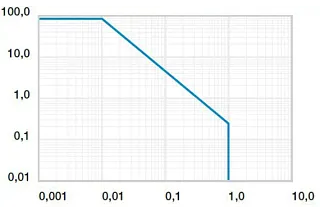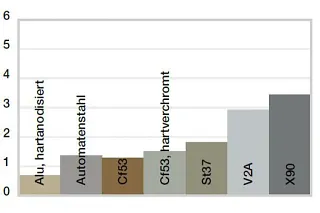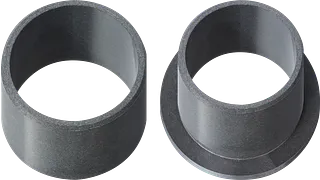Change Language :
iglidur® G1 - Material data
The most important specifications at a glance
The requirement profile is demanding: Comprehensive advanced development of the successful all-round classic iglidur G. This has been achieved especially in terms of moisture absorption, thermal properties and consistently improved wear resistance. Only with shock, impact and edge loads, the robustness of iglidur G could not quite be achieved.
| Descriptive technical specifications | ||
|---|---|---|
| Wear resistance at +23°C | - 🟧 🟧 🟧 🟧 ⬜️ + | More information on wear resistance |
| Wear resistance at +90°C | - 🟧 🟧 🟧 🟧 ⬜️ + | |
| Wear resistance at +150°C | - 🟧 🟧 🟧 ⬜️ ⬜️ + | |
| Surface pressure | - 🟧 🟧 🟧 ⬜️ ⬜️ + | 91MPa |
| Coefficient of friction | - 🟧 🟧 ⬜️ ⬜️ ⬜️ + | Coefficients of friction µ, dry: 0.11 |
| Wear resistance under water | - 🟧 ⬜️ ⬜️ ⬜️ ⬜️ + | |
| Media resistance | - 🟧 🟧 🟧 ⬜️ ⬜️ + | More information on media resistance |
| Resistant to edge pressures | - 🟧 🟧 🟧 ⬜️ ⬜️ + | |
| Resistant to shock and impact loads | - 🟧 🟧 🟧 ⬜️ ⬜️ + | |
| Dirt resistance | - 🟧 🟧 🟧 🟧 ⬜️ + | |
| Mould resistance | - 🟧 🟧 🟧 🟧 🟧 + | According to DIN EN ISO 846 |
Temperature
The ambient temperatures strongly influence the properties of plain bearings. The temperatures prevailing in the bearing system also have an influence on its wear. With increasing temperatures, the wear increases and this effect is significant when temperatures rise over +120°C. For temperatures over 120°C, an additional securing of the bearings in the housing is required.
| min. application temperature | Upper application temperature, long-term | Upper application temperature, short-term | In addition secure axially from |
|---|---|---|---|
| -40°C | +180°C | +220°C | +120°C |
Permissible surface speeds
iglidur G1 was developed for low to medium surface speeds. The maximum values specified under "Maximum surface speed" can only be achieved at low pressures. At the specified speeds, friction can a temperature increase to maximum permissible levels. In practice, these limit values cannot always be achieved due to the interaction of various influences.
Maximum surface speed
| m/s | Rotating | Oscillating | linear |
|---|---|---|---|
| permanent | 1.3 | 1.0 | 5.0 |
| Short-term | 2.5 | 1.8 | 6.0 |
Permissible p x v values

Diagram 01: Permissible pv values for iglidur® G1 plain bearings with 1mm wall thickness in dry operation against a steel shaft, at +20°C, installed in a steel housing.
X-axis = surface speed [m/s]
Y-axis = load [MPa]
p x v value, max. (dry)
MPa · m/s
0.60
Mechanical specification
The compressive strength of iglidur G1 plain bearings decreases with increasing temperatures. Diagram 02 illustrates this relationship. At the long-term permissible application temperature of +180°C, the permissible surface pressure is approximately 40MPa. The maximum recommended surface pressure represents a mechanical material parameter. No conclusions about the tribological properties can be drawn from this. Diagram 03 shows the elastic deformation of iglidur G1 under radial loads. Plastic deformation can be negligible up to a pressure of approx. 100MPa. However, it also depends on the duration of the effect.
Friction and wear
The coefficient of friction μ of a plain bearing is influenced by surface speed and load, among other factors (diagram 04 and 05).
Coefficients of friction for iglidur G1 against steel (Ra = 1µm, 50HRC):
| iglidur® G1 | Dry | Greases | Oil | Water |
|---|---|---|---|---|
| Coefficient of friction µ | 0.13 - 0.32 | 0.09 | 0.04 | 0.04 |
Shaft materials

Abb. 06: Verschleiß, rotierend mit unterschiedlichen Wellenwerkstoffen, p = 1 MPa, v = 0,3 m/s
X = Wellenwerkstoff
Y = Verschleiß [μm/km]
The friction and wear are also dependent, to a large degree, on the mating partner. Shafts that are too smooth increase both the coefficient of friction and the wear of the bearing. For iglidur G1 a ground surface with an average surface finish Ra = 0.8µm is recommended. Diagram 06 shows an extract of results of tests with different shaft materials with plain bearings made from iglidur G1. It can be observed that iglidur G1 achieves good to very good wear results with all shaft materials. The results for stainless steel types are most likely slightly lower. As with many of the iglidur materials, the wear rate is better in pivoting than rotating applications.
Installation tolerances
iglidur G1 plain bearings are standard bearings for shafts with h-tolerance (recommended minimum h9). The bearings are designed for press fitting into a housing machined to a h7 tolerance. After installation into a nominal size housing, in standard cases the inner diameter automatically adjusts to the F10 tolerances. For certain dimensions, the tolerance deviates from this depending on the wall thickness (see product range).
Important tolerances according to ISO 3547-1 after the press-fit:
| Diameter d1 [mm] | Housing H7 [mm] | plain bearing F10 [mm] | Shaft h9 [mm] |
|---|---|---|---|
| up to 3 | +0.000 +0.010 | +0.006 +0.046 | -0.025 +0.000 |
| > 3 up to 6 | +0.000 +0.012 | +0.010 +0.058 | -0.030 +0.000 |
| > 6 up to 10 | +0.000 +0.015 | +0.013 +0.071 | -0.036 +0.000 |
| > 10 up to 18 | +0.000 +0.018 | +0.016 +0.086 | -0.043 +0.000 |
| > 18 up to 30 | +0.000 +0.021 | +0.020 +0.104 | -0.052 +0.000 |
| > 30 up to 50 | +0.000 +0.025 | +0.025 +0.125 | -0.062 +0.000 |
| >50 to 80 | +0.000 +0.030 | +0.030 +0.150 | -0.074 +0.000 |
| >80 to 120 | +0.000 +0.035 | +0.036 +0.176 | -0.087 +0.000 |
| > 120 up to 180 | +0.000 +0.040 | +0.043 +0.203 | +0.000 +0.100 |
Chemical resistance
All data at room temperature [+20 °C], + resistant 0 conditionally resistant - non-resistant
| Medium | Resistance |
|---|---|
| Alcohols | + up to 0 |
| Hydrocarbons | + |
| Diluted acids | 0 to - |
| Strong acids | - |
| Diluted alkalines | + |
| Strong alkalines | 0 |
| Greases, oils without additives | + |
| Fuels | + |

Buy iglidur G1 products in the online shop
- Large selection of moulds and materials
- Available within 24 hours
- No minimum order value
- No minimum order quantity
Typical application areas
Consulting
I look forward to answering your questions

Shipping and consultation
In person:
Monday to Friday from 09:00 - 17:00
Online:
24h






